Substitute for vegetable oil
Overview of the Importance of Vegetable Oil in Cooking
Vegetable Oil Substitutes, a staple in kitchens worldwide, are prized for their versatility and functionality in cooking and baking. Its neutral flavour, varying smoke points, and ability to blend seamlessly into many recipes make it an indispensable ingredient. Whether it’s frying, sautéing, baking, or dressing salads, vegetable oil serves multiple purposes: providing the fat needed to carry flavours, ensuring moisture, creating texture, and facilitating chemical reactions essential in cooking. From crispy fried foods to moist cakes, the role of vegetable oil is undeniable in achieving the desired outcomes in countless dishes.
The Need for Substitutes: Dietary Restrictions, Health Considerations, and Flavor Profiles
Despite its widespread use, there’s a growing demand for substitutes for vegetable oil due to various factors. Dietary restrictions, such as allergies to specific cups of oil sources or adherence to special diets like veganism, necessitate alternatives. Health considerations also play a significant role; with increasing awareness about the impacts of fats on heart health and cholesterol levels, many seek healthier options with lower saturated fat content or more beneficial fatty acid compositions. Moreover, flavour profiles matter; different oils can impart unique tastes to dishes, inviting culinary experimentation. These factors drive the exploration of suitable vegetable oil substitutes that accommodate health needs, dietary choices, and the pursuit of new and enhanced flavours in heat cooking.
- Dietary Restrictions: Tailoring food choices to accommodate various dietary needs, such as allergies, intolerances, vegetarianism, or religious restrictions, requires great substitutes to ensure nutritional adequacy and variety.
- Health Considerations: Substitutes can be crucial in managing health conditions (like diabetes and heart disease) by replacing high-sugar, high-fat, or high-calorie ingredients with healthier alternatives to maintain a balanced diet.
- Flavour Profiles: Incorporating substitutes doesn’t just address health or dietary needs; it’s also about exploring new flavours and textures, and enriching culinary experiences while staying within dietary boundaries.
- Sustainability and Ethical Choices: The shift towards plant-based substitutes for meat and dairy is driven by environmental concerns and ethical considerations, aiming to reduce carbon footprint and animal cruelty.
Understanding Best Vegetable Oil and Its Common Uses
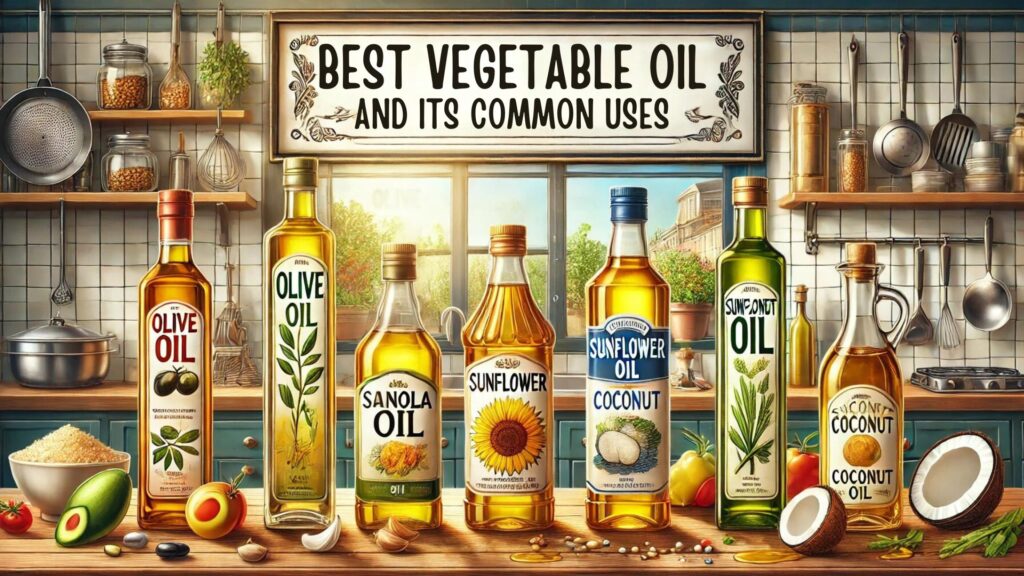
The Role of Vegetable Oil in Cooking and Baking
Vegetable oil is a kitchen workhorse, contributing as a cooking medium and a critical ingredient in emulsification and baked goods. Its high smoke point makes it ideal for high-heat cooking methods like frying, while its fat content is crucial for the texture and moisture of baked recipes. In dressings and marinades, it acts as a carrier for other flavours, blending and harmonizing the various components. The utility of vegetable oil extends beyond just cooking; it’s essential in creating a non-stick surface for baking and cooking, making it a fundamental tool for both home cooks and professional chefs.
- Moisture and Texture: In baking, vegetable oil adds moisture and creates a tender texture in products like cakes and breads. It can make baked goods softer and prevent them from drying out.
- Heat Transfer: Vegetable oil is essential for frying and sautéing, as it efficiently transfers heat from the cookware to the food, ensuring even cooking and browning.
- Flavour Carrier: Vegetable oil is often used as a medium to carry flavours of spices and herbs in dishes. It can absorb and distribute flavours throughout the dish, enhancing the overall taste.
- Non-Stick Agent: Vegetable oil is commonly used to grease pans and baking sheets to prevent food from sticking and ensure easy food release after cooking or baking.
Different Types of Vegetable Oils and Their Characteristics
Various vegetable oils are available, each with unique characteristics and uses. Common types include soybean, canola, sunflower, walnut oil, and extra-virgin olive oil. Soybean oil is versatile, neutral in flavour, and suitable for different cooking methods. Canola oil is low in saturated fat, has a mild taste, and has a high smoke point, making it ideal for frying and baking. Sunflower oil is neutral, rich in vitamin E, and suitable for general cooking. Extra-virgin olive oil has a robust flavour and health benefits, and it is best used in dressings or low-heat cooking. Different oils have specific nutritional profiles and flavours, influencing the choice based on cooking needs and desired health outcomes.
Why Look for a vegetable oil substitute?
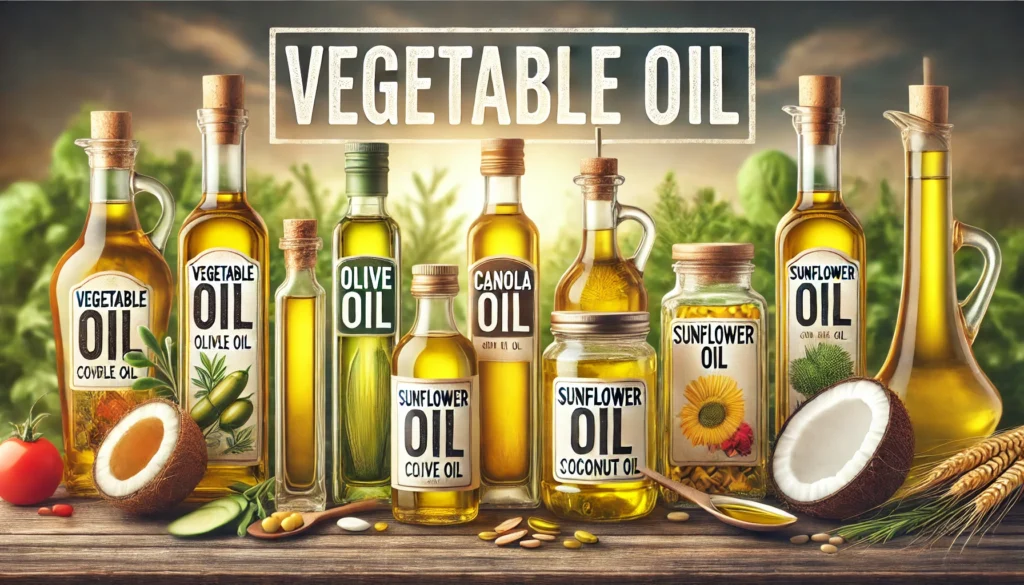
Health Implications of Using Vegetable Oil
Concerns over the health implications of consuming certain vegetable oils have emerged, particularly those high in omega-6 fatty acids or processed through chemicals and high heat, potentially leading to unhealthy compounds. The balance between omega-6 and omega-3 fatty acids in the diet is also a consideration, as modern diets often lean heavily towards omega-6, which can contribute to inflammation when not balanced by omega-3 intake. Moreover, trans fats, found in partially hydrogenated oils, raise LDL (harmful) cholesterol levels and lower HDL (good) cholesterol levels, increasing the risk of heart disease.
Dietary Restrictions (e.g., allergies, veganism)
Dietary restrictions necessitate the search for suitable oil substitutes. Allergies to specific oil sources, like nuts or soy, require alternatives that avoid these allergens. Vegan diets might seek substitutes for animal fats or products not considered vegan. The need to accommodate these dietary restrictions without compromising taste or texture has led to exploring a broad spectrum of oil alternatives. Here are four points about dietary restrictions, such as allergies and veganism:
- Allergies: Involve an immune system reaction to certain foods ranging from mild to potentially life-threatening, like nut or shellfish allergies.
- Veganism: Veganism is the dietary choice of avoiding all animal products and by-products, including meat, dairy, and eggs, often motivated by health, ethical, or environmental reasons.
- Lactose Intolerance: Lactose Intolerance is not an allergy but a common dietary restriction in which individuals have difficulty digesting lactose, a sugar found in milk and dairy products.
- Celiac Disease: An autoimmune disorder where ingestion of gluten leads to damage in the small intestine, necessitating a strict gluten-free diet.
Flavor Enhancement
Another compelling reason to explore oil substitutes is the pursuit of flavour enhancement. Different oils can impart distinct tastes, ranging from walnut oil’s nutty richness to olive oil’s fruity notes. Utilizing these flavours can transform a dish, adding depth and complexity. Culinary experimentation with various oil alternatives opens up new possibilities for flavour profiles, elevating the dining experience.
Environmental and Ethical Considerations
Environmental sustainability and ethical concerns also influence the choice of cooking oils. The production of some vegetable oils has significant environmental impacts, including deforestation, loss of biodiversity, and greenhouse gas emissions. Ethical considerations, such as labour practices and the use of genetically modified organisms (GMOs), further complicate the choice of oils for the conscientious consumer. Seeking substitutes that align with environmental sustainability and ethical practices has become increasingly important for many individuals.
Types of Vegetable Oil Substitutes
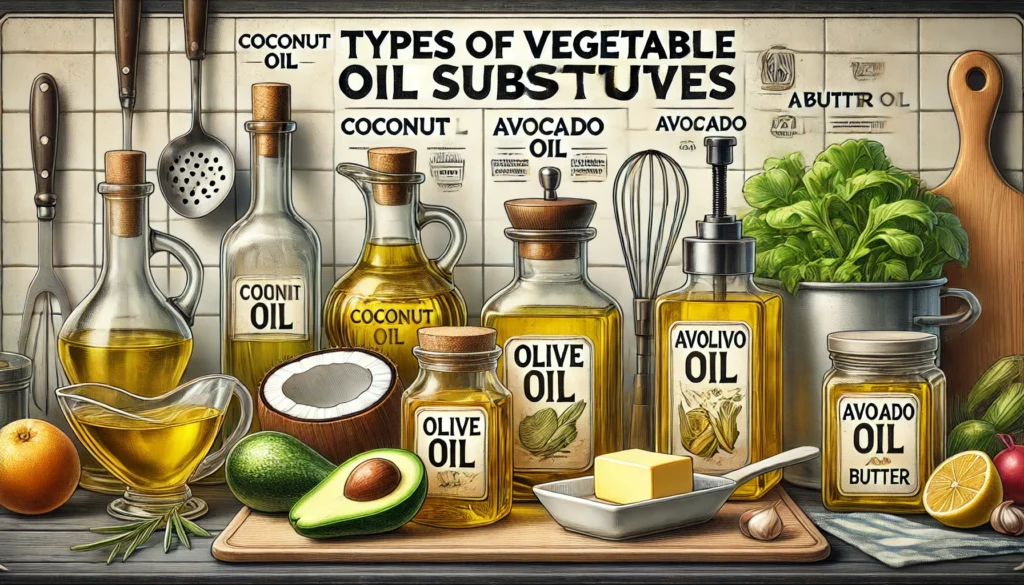
Selecting a substitute for vegetable oil depends on the cooking method, desired flavour profile, and nutritional considerations. Experimenting with different oils and fats can unlock new tastes and textures in your cooking and baking, enhancing your culinary creations while aligning with health, dietary, and ethical goals.
For Baking
- Butter or Ghee: Both add richness and depth of flavour to baked goods. Ghee is clarified butter that is lactose-free and has a high smoke point.
- Coconut Oil: Coconut Oil is a vegan option with a slight coconut flavour. It’s solid at room temperature and can be used as a substitute for butter.
- Applesauce: For a low-fat option, applesauce can replace oil in many recipes, offering moisture and sweetness with fewer calories.
For Frying
- Avocado Oil: Boasts a high smoke point, making it ideal for high-heat cooking. It’s also rich in monounsaturated fats, which can benefit heart health.
- Peanut Oil: Peanut Oil is often used in frying for its high smoke point and neutral flavor, making it suitable for deep-frying and stir-frying.
For Salad Dressings and Marinades
- Olive Oil: A staple in Mediterranean cooking, olive oil is flavorful and heart-healthy, perfect for dressings and marinades.
- Sesame Oil: Adds a nutty flavour to dishes, ideal for Asian-inspired salad dressings and marinades.
- Flaxseed Oil: High in omega-3 fatty acids, it’s a nutritious option for cold dishes but should not be used for cooking due to its low smoke point.
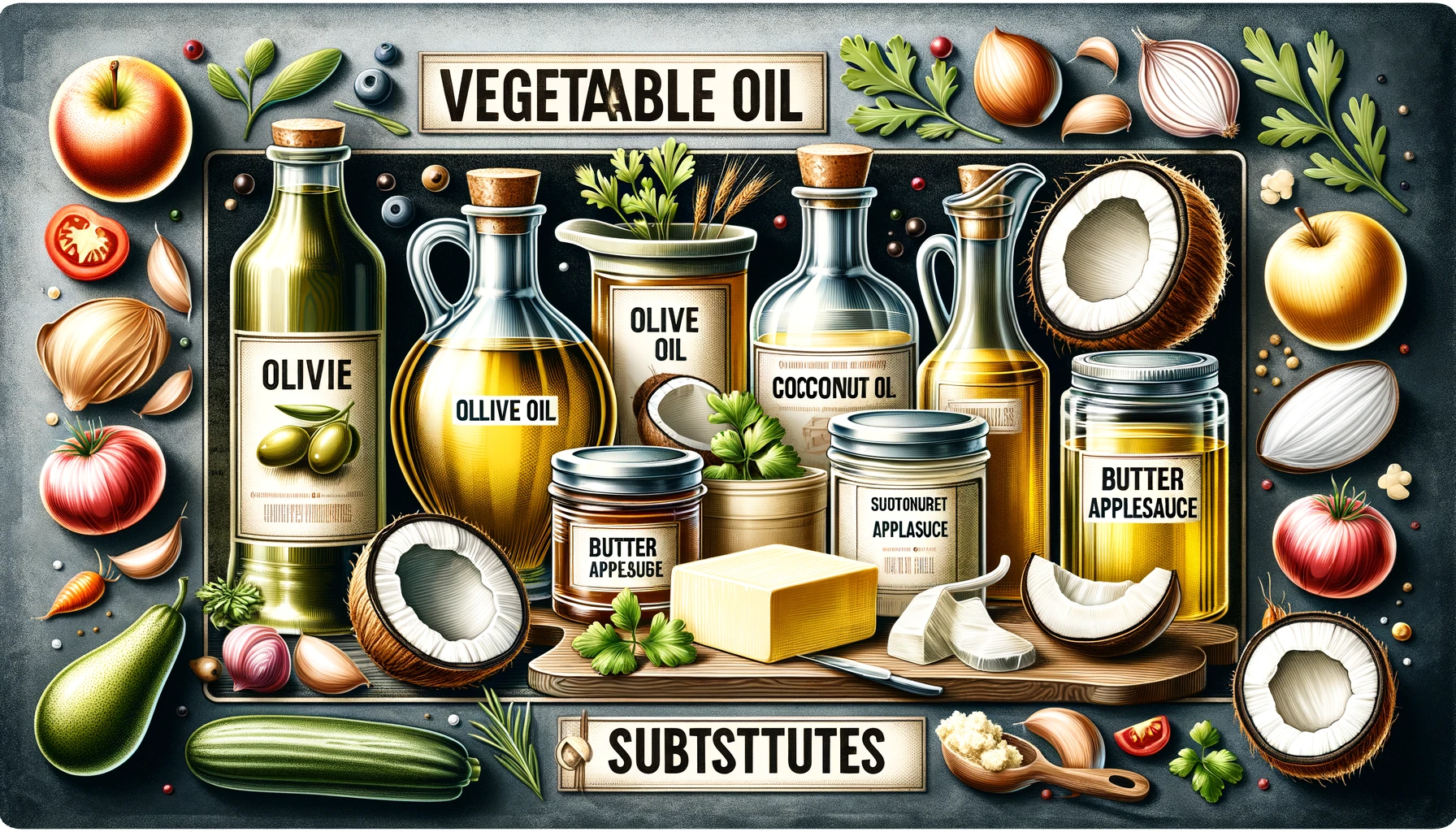
Detailed Guide to substitute for vegetable oil
The exploration for vegetable oil substitutes is not just about finding an alternative; it’s about enhancing flavour, catering to health considerations, and sometimes even improving the nutritional profile of your dishes. Each substitute brings its own unique qualities to the table—literally and metaphorically. Here’s a detailed look at some of the most popular alternatives:
Olive Oil: A Heart-Healthy Alternative
Olive oil, particularly extra virgin olive oil, is celebrated for its heart-healthy monounsaturated fats and its rich, fruity flavour that can enhance the taste of both cooked and raw dishes. It’s a fantastic choice for salad dressings, marinades, and for cooking at low to medium heats. However, its distinct flavour might not always suit sweets or desserts.
Coconut Oil: Best for Baking and Unique Flavor
With its subtle sweetness and high saturated fat content, coconut oil is a favoured choice in baking. It can add a unique flavour to cookies, cakes, and other baked goods. Coconut oil is solid at room temperature, making it a good substitute for butter or shortening. It’s also suitable for sautéing and frying, but its coconut flavour might not pair well with all dishes.
Butter and Ghee: Richness in Flavor for Baking
With its creamy and rich flavour, butter is a preferred choice for baking, offering a depth of flavour that most oils cannot match. Ghee, or clarified butter, provides a nuttier taste and is lactose-free, making it a good alternative for those with dairy sensitivities. Both butter and ghee can be used in frying and sautéing, imparting a rich flavour to dishes.
Avocado Oil: High Smoke Point, Ideal for Frying
Avocado oil boasts a high smoke point, making it excellent for high-heat cooking methods like frying and searing. Its mild flavour and health benefits, similar to olive oil, make it a versatile substitute in cooking and baking, though it tends to be pricier.
Applesauce and Yogurt: Low-fat Options for Baking
For those seeking to reduce fat in their diet, unsweetened applesauce and plain yoghurt are fantastic substitutes for baking. They can replace oil in a 1:1 ratio, adding moisture to cakes, muffins, and breads without the extra fat. Note that this substitution might affect texture slightly, making baked goods denser.
Nut Oils: Flavorful Options for Dressings and Dips
Nut oils like walnut, almond, and hazelnut oil add flavor to salad dressings, dips, and finish dishes. They generally have a lower smoke point and are best used in cold applications or added to dishes after cooking to preserve their delicate flavors.
How to Choose the Right Substitute
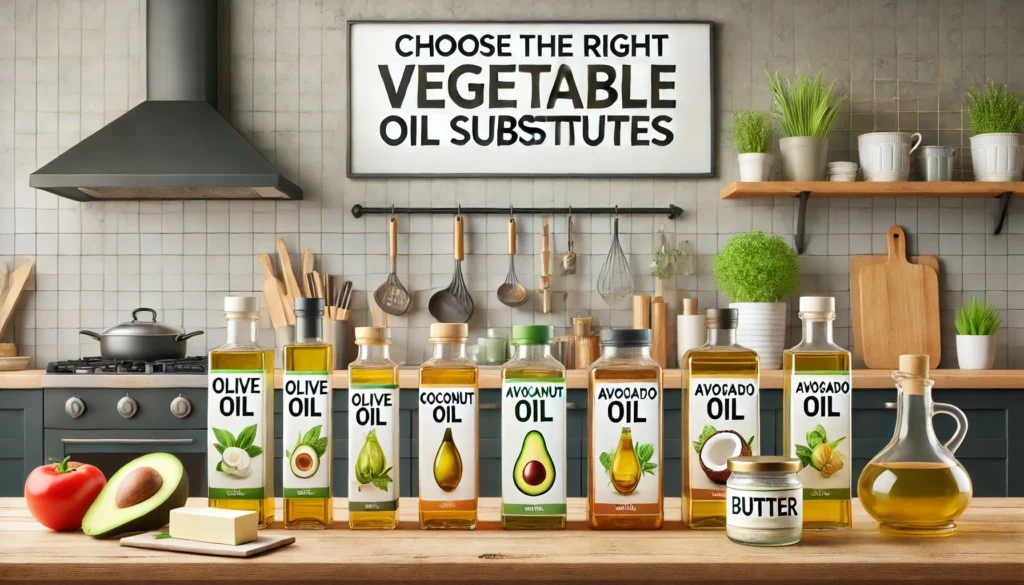
Considering the Flavor Profile
The substitute’s flavor profile should complement the dish. Olive and nut oils have distinctive tastes that enhance certain recipes, while neutral oils like avocado are more versatile. For desserts, butter, coconut oil, or even applesauce might be more appropriate.
Heat Tolerance and Cooking Method
The cooking method can dictate your choice of substitute. High-smoke point oils like avocado and refined coconut oil are ideal for frying, while olive oil and butter are better suited for lower temperatures. Solid fats like butter or coconut oil can offer the right consistency for baking. Certainly! When discussing “Heat Tolerance and Cooking Methods,” there are several vital points to consider:
Health and Nutritional Benefits
Choosing a substitute can also be influenced by health considerations. Olive oil and avocado oil are praised for their heart-healthy fats. For those reducing saturated fat intake, unsweetened applesauce or yogurt can replace oil in baking without compromising moisture. Here are four simple bullet points on the health and nutritional benefits:
- Rich in Essential Nutrients: Many foods, especially fruits, vegetables, grains, and lean proteins, provide essential vitamins, minerals, and nutrients necessary for the body’s optimal functioning, supporting overall health and well-being.
- Improves Heart Health: A diet high in whole foods, like fruits, vegetables, and whole grains, and low in processed foods can help reduce the risk of heart diseases by maintaining healthy blood pressure and cholesterol levels.
- Supports Weight Management: Eating a balanced diet with the right portion sizes can help maintain a healthy weight, reducing the risk of obesity-related diseases like type 2 diabetes, heart disease, and certain cancers.
- Enhances Mental Health: Nutritional food choices can influence brain health, improving mood and cognitive functions. Foods rich in omega-3 fatty acids, antioxidants, and vitamins have been linked to lower rates of depression and cognitive decline.
Pros and Cons of vegetable
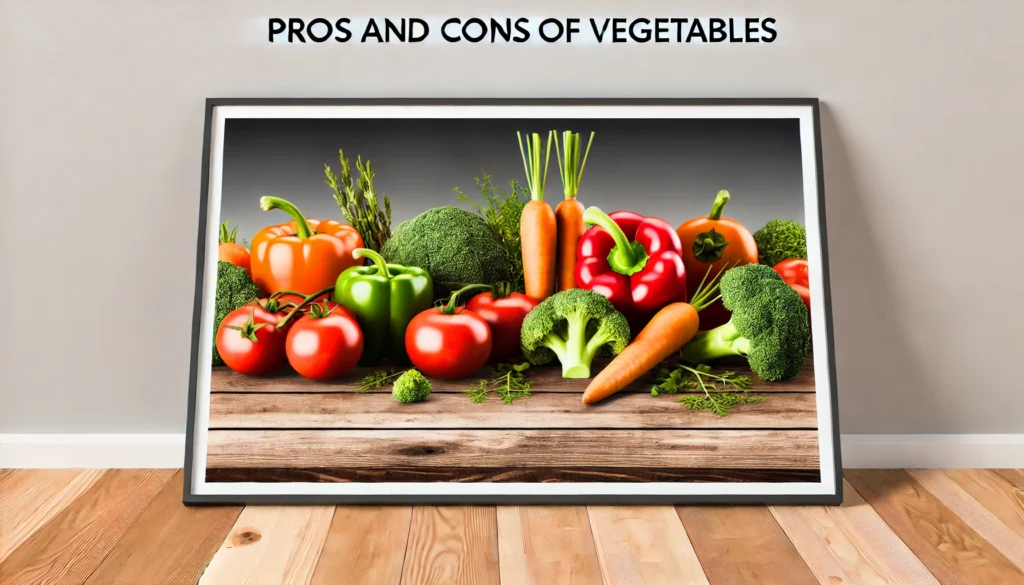
Frequently Asked Questions (FAQs) on Vegetable Oil Substitutes
Q1: Can I use olive oil instead of vegetable oil on the cake?
Yes, you can use olive oil as a substitute for vegetable oil in cakes. Olive oil is particularly suitable for recipes whose fruity flavour complements the other ingredients. However, for a more neutral taste, consider using light olive oil.
Q2: What is the healthiest substitute for vegetable oil in frying?
Avocado oil is one of the healthiest substitutes for vegetable oil in frying due to its high smoke point and beneficial monounsaturated fats. It’s ideal for high-heat cooking and has a neutral flavour.
Q3: How do I substitute butter for vegetable oil in recipes?
To substitute butter for vegetable oil in recipes, use the same amount of melted butter as the oil called for. This swap is perfect for baking and adds a rich flavour to the dish.
Q4: Are there any non-fat substitutes for vegetable oil in baking?
Unsweetened applesauce is a popular non-fat substitute for vegetable oil in baking. Use it in a 1:1 ratio for the oil in recipes like cakes and muffins to reduce fat without losing moisture.
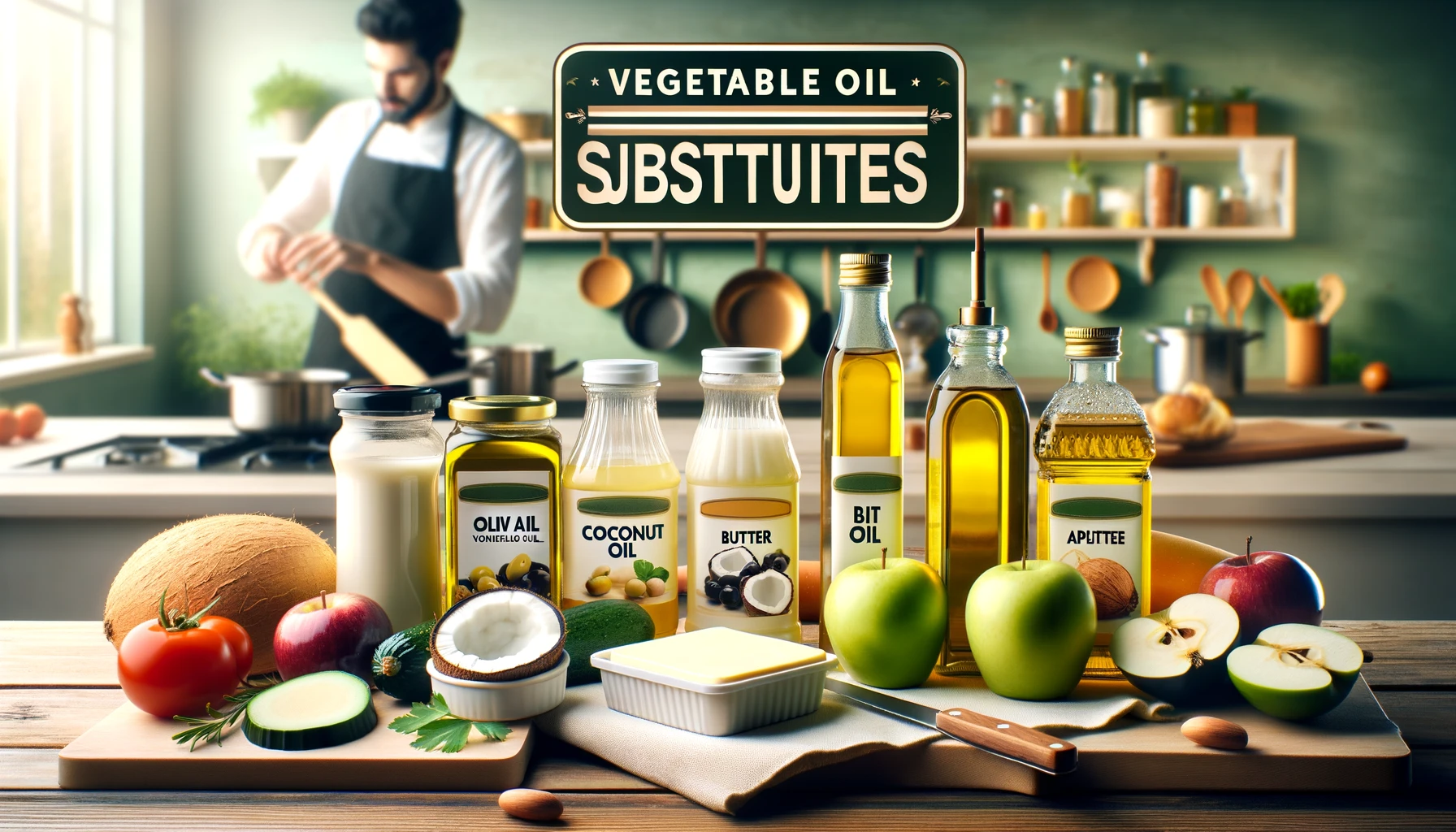
3 thoughts on “Vegetable Oil Revolution: 10 Proven Benefits to Boost Your Health!”